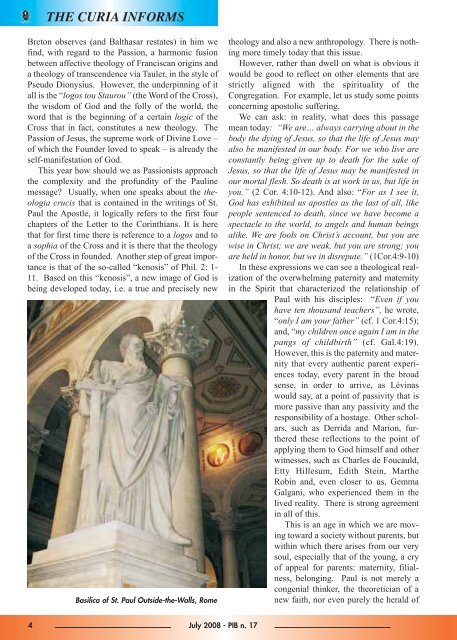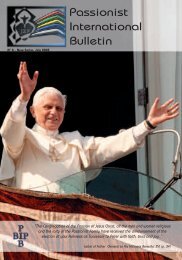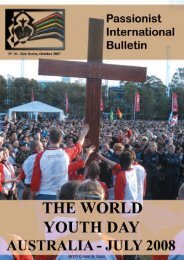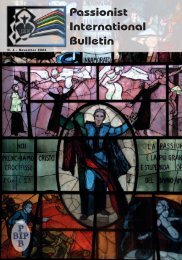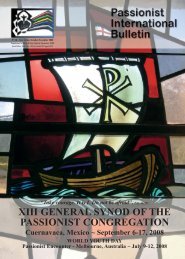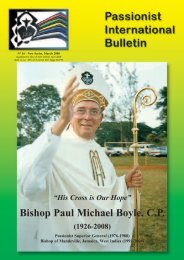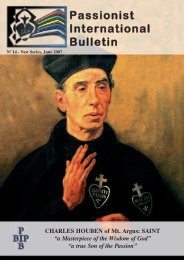the curia informs - Passio Christi
the curia informs - Passio Christi
the curia informs - Passio Christi
You also want an ePaper? Increase the reach of your titles
YUMPU automatically turns print PDFs into web optimized ePapers that Google loves.
THE CURIA INFORMS<br />
Breton observes (and Balthasar restates) in him we<br />
find, with regard to <strong>the</strong> <strong>Passio</strong>n, a harmonic fusion<br />
between affective <strong>the</strong>ology of Franciscan origins and<br />
a <strong>the</strong>ology of transcendence via Tauler, in <strong>the</strong> style of<br />
Pseudo Dionysius. However, <strong>the</strong> underpinning of it<br />
all is <strong>the</strong> “logos tou Staurou” (<strong>the</strong> Word of <strong>the</strong> Cross),<br />
<strong>the</strong> wisdom of God and <strong>the</strong> folly of <strong>the</strong> world, <strong>the</strong><br />
word that is <strong>the</strong> beginning of a certain logic of <strong>the</strong><br />
Cross that in fact, constitutes a new <strong>the</strong>ology. The<br />
<strong>Passio</strong>n of Jesus, <strong>the</strong> supreme work of Divine Love –<br />
of which <strong>the</strong> Founder loved to speak – is already <strong>the</strong><br />
self-manifestation of God.<br />
This year how should we as <strong>Passio</strong>nists approach<br />
<strong>the</strong> complexity and <strong>the</strong> profundity of <strong>the</strong> Pauline<br />
message Usually, when one speaks about <strong>the</strong> <strong>the</strong>ologia<br />
crucis that is contained in <strong>the</strong> writings of St.<br />
Paul <strong>the</strong> Apostle, it logically refers to <strong>the</strong> first four<br />
chapters of <strong>the</strong> Letter to <strong>the</strong> Corinthians. It is here<br />
that for first time <strong>the</strong>re is reference to a logos and to<br />
a sophia of <strong>the</strong> Cross and it is <strong>the</strong>re that <strong>the</strong> <strong>the</strong>ology<br />
of <strong>the</strong> Cross in founded. Ano<strong>the</strong>r step of great importance<br />
is that of <strong>the</strong> so-called “kenosis” of Phil. 2: 1-<br />
11. Based on this “kenosis”, a new image of God is<br />
being developed today, i.e. a true and precisely new<br />
Basilica of St. Paul Outside-<strong>the</strong>-Walls, Rome<br />
<strong>the</strong>ology and also a new anthropology. There is nothing<br />
more timely today that this issue.<br />
However, ra<strong>the</strong>r than dwell on what is obvious it<br />
would be good to reflect on o<strong>the</strong>r elements that are<br />
strictly aligned with <strong>the</strong> spirituality of <strong>the</strong><br />
Congregation. For example, let us study some points<br />
concerning apostolic suffering.<br />
We can ask: in reality, what does this passage<br />
mean today: “We are… always carrying about in <strong>the</strong><br />
body <strong>the</strong> dying of Jesus, so that <strong>the</strong> life of Jesus may<br />
also be manifested in our body. For we who live are<br />
constantly being given up to death for <strong>the</strong> sake of<br />
Jesus, so that <strong>the</strong> life of Jesus may be manifested in<br />
our mortal flesh. So death is at work in us, but life in<br />
you.” (2 Cor. 4:10-12). And also: “For as I see it,<br />
God has exhibited us apostles as <strong>the</strong> last of all, like<br />
people sentenced to death, since we have become a<br />
spectacle to <strong>the</strong> world, to angels and human beings<br />
alike. We are fools on Christ’s account, but you are<br />
wise in Christ; we are weak, but you are strong; you<br />
are held in honor, but we in disrepute.” (1Cor.4:9-10)<br />
In <strong>the</strong>se expressions we can see a <strong>the</strong>ological realization<br />
of <strong>the</strong> overwhelming paternity and maternity<br />
in <strong>the</strong> Spirit that characterized <strong>the</strong> relationship of<br />
Paul with his disciples: “Even if you<br />
have ten thousand teachers”, he wrote,<br />
“only I am your fa<strong>the</strong>r” (cf. 1 Cor.4:15);<br />
and, “my children once again I am in <strong>the</strong><br />
pangs of childbirth” (cf. Gal.4:19).<br />
However, this is <strong>the</strong> paternity and maternity<br />
that every au<strong>the</strong>ntic parent experiences<br />
today, every parent in <strong>the</strong> broad<br />
sense, in order to arrive, as Lévinas<br />
would say, at a point of passivity that is<br />
more passive than any passivity and <strong>the</strong><br />
responsibility of a hostage. O<strong>the</strong>r scholars,<br />
such as Derrida and Marion, fur<strong>the</strong>red<br />
<strong>the</strong>se reflections to <strong>the</strong> point of<br />
applying <strong>the</strong>m to God himself and o<strong>the</strong>r<br />
witnesses, such as Charles de Foucauld,<br />
Etty Hillesum, Edith Stein, Mar<strong>the</strong><br />
Robin and, even closer to us, Gemma<br />
Galgani, who experienced <strong>the</strong>m in <strong>the</strong><br />
lived reality. There is strong agreement<br />
in all of this.<br />
This is an age in which we are moving<br />
toward a society without parents, but<br />
within which <strong>the</strong>re arises from our very<br />
soul, especially that of <strong>the</strong> young, a cry<br />
of appeal for parents: maternity, filialness,<br />
belonging. Paul is not merely a<br />
congenial thinker, <strong>the</strong> <strong>the</strong>oretician of a<br />
new faith, nor even purely <strong>the</strong> herald of<br />
4<br />
July 2008 - PIB n. 17


